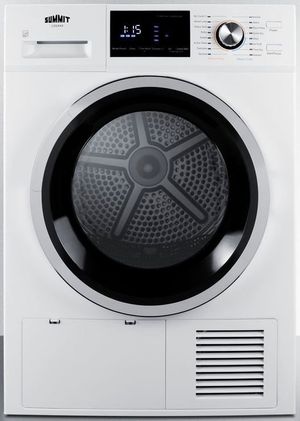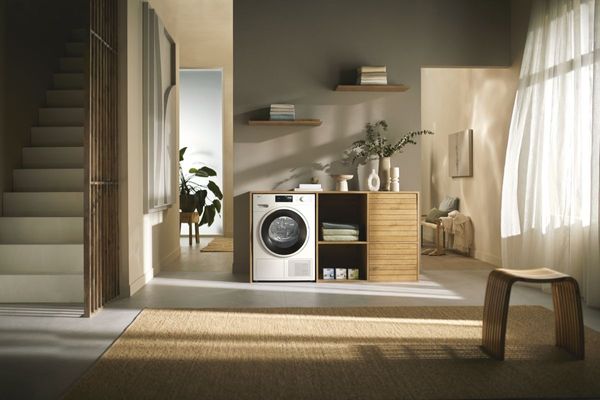
At a Glance:
Pros & Cons of Heat Pump Dryers
Is a Heat Pump Dryer Worth It?
5 Featured Heat Pump Dryers to Try
Looking for a ventless dryer solution or just hoping to upgrade to a more energy-efficient dryer? A heat pump dryer might be the answer you’ve been looking for. Heat pump technology has long been used in air conditioners and refrigerators, and now that same technology is being used to power electric dryers. It’s only in the last decade that these dryers have made their way into the U.S. market, so you might not be as familiar with them—but you need to be. In this guide, we’ll cover the basics of how a heat pump dryer works, compare the pros and cons compared to other clothes dryer options, and explain why we think they’re worth the investment. Then, we’ll recommend our 6 favorite heat pump dryers from Arnold’s Appliance.
Explore Dryers at Arnold's Appliance
Need a new dryer? Discover condensation, heat pump, and vented dryers from leading brands at Arnold's, today!
Shop DryersWhat Is a Heat Pump Dryer?
Before we dive into what you need to know about heat pump dryers, let’s start by explaining the different types of dryers available, each with its own technology and features. For example, how do vented vs heat pump dryer models compare?
➤ Heat Pump Dryers: These are energy-efficient dryers that use a heat pump to recycle hot air, reducing energy consumption and being gentle on clothes.
➤ Vented Dryers: The most traditional type, vented dryers expel hot, moist air through a vent to the outside of your home. They are usually less expensive but can be less energy-efficient.
➤ Condenser Dryers: These dryers do not require external venting. Instead, they condense the moisture from the clothes into water, which is collected in a reservoir or drained away. They are more versatile in placement but can use more energy than vented dryers.
➤ Gas Dryers: Gas dryers use natural gas or propane to generate heat, making them typically faster and more energy-efficient than electric dryers. However, they require a gas hookup and proper ventilation.
➤ Electric Dryers: Electric dryers use electricity to power a heating element that dries clothes by circulating warm air through the drum. They are easier to install, as they only need a standard electrical outlet, but may take longer to dry clothes compared to gas dryers.
So, what makes a heat pump dryer a superior choice? Well, a heat pump dryer operates using advanced technology to dry clothes more efficiently than traditional models. It works by using a heat pump to draw in ambient air, which is then heated and passed through the drum to dry the clothes.
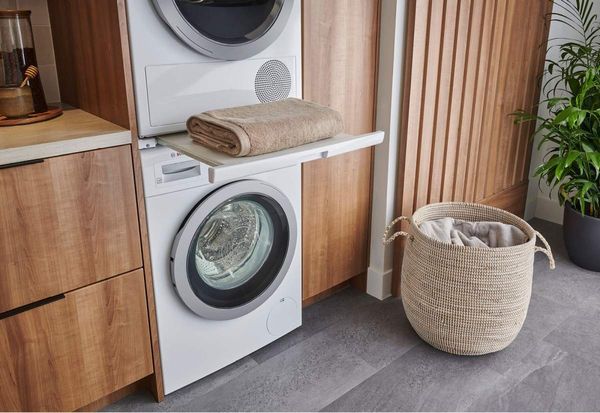
Unlike conventional dryers that vent hot, moist air outside, a heat pump dryer recycles this air by removing the moisture and reheating it for continued use, creating a closed-loop system. This process not only conserves energy but also dries clothes at lower temperatures, making it gentler on fabrics and reducing the risk of damage.
One of the key differences is that heat pump dryers do not require external venting, which makes them more versatile for installation in various locations, including places where venting is not possible. This combination of energy efficiency, fabric care, and installation flexibility makes heat pump dryers a standout choice for modern homes.
Browse Heat Pump Dryers
Pros & Cons of Heat Pump Dryers
Next, let’s consider the pros and cons of opting for a heat pump dryer over a standard vented dryer or one of the other options.
Pros:
✅ Energy Efficiency: Heat pump dryers are highly energy-efficient, using up to 50% less energy than traditional dryers. This is because they recycle hot air, which reduces energy consumption and can lead to significant savings on utility bills.
✅ Gentle on Clothes: The lower drying temperatures of heat pump dryers are gentler on fabrics, reducing the risk of shrinkage or damage to delicate items. This helps extend the lifespan of your clothing.
✅ Environmentally Friendly: By using less energy, heat pump dryers have a smaller carbon footprint, making them an environmentally friendly choice. They contribute to reducing overall energy consumption in your home.
✅ No Ventilation Required: Heat pump dryers do not require external ventilation, which makes them easier to install and more versatile in terms of placement within your home. They are ideal for apartments or spaces where venting to the outside is not possible.
✅ Moisture Control: These dryers are effective at controlling moisture levels, which helps prevent humidity build-up in your laundry room. This can protect your home from potential mold or mildew issues.
Cons:
❌ Higher Initial Cost: Heat pump dryers tend to have a higher upfront cost compared to traditional dryers. The investment can be significant, although it is often offset by energy savings over time.
❌ Longer Drying Times: Due to their lower drying temperatures, heat pump dryers typically take longer to dry clothes than traditional dryers. This might be inconvenient for those who need quick drying cycles.
❌ Maintenance Needs: Heat pump dryers can require more maintenance, such as cleaning filters and condensers, to ensure optimal performance. Regular upkeep is necessary to maintain efficiency and longevity.
Is a Heat Pump Dryer Worth It?
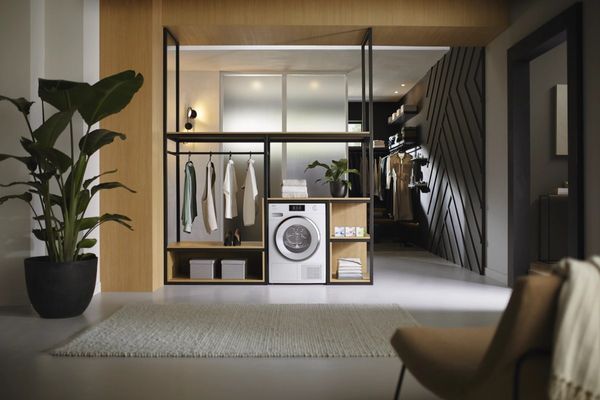
Yes, a heat pump dryer is worth the investment for many homeowners. While the initial cost is higher, the energy savings over time can be substantial, making it an economical choice in the long run.
The gentle drying process helps preserve your clothes, reducing wear and tear, which is especially beneficial for those who want to extend the lifespan of their wardrobe. Additionally, the environmental benefits of lower energy consumption and reduced carbon footprint make it a responsible choice for eco-conscious consumers. The flexibility of installation due to the lack of ventilation requirements also adds to its appeal.
According to Bosch, heat pump dryers are worth it because of energy efficiency, flexibility of placement, and gentle fabric care and protection from overdrying. And we agree! Despite the longer drying times and maintenance needs, the overall benefits of efficiency, environmental impact, and fabric care make a heat pump dryer a smart and worthwhile investment.
5 Featured Heat Pump Dryers to Try
Keep reading for our top heat pump dryer picks along with a couple of heat pump clothes dryer reviews from customers like you.
Bosch 800 Series 24” Pearl Steel Front Load Ventless Electric Dryer
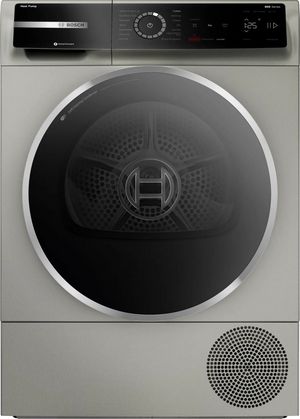
Shop this Bosch Heat Pump Dryer
This Bosch heat pump clothes dryer is an ENERGY STAR certified dryer with ventless installation. Flexibility is the name of the game here—from flexibility in placement to a reversible dryer door and the ability to stack with your washer. The stainless steel drum is durable and gentler on your clothes than a plastic tub. You can simplify laundry day thanks to the Home Connect app’s Smart Dry feature, which automatically selects the right drying program to match your most recent wash cycle. Overall, this is a convenient and powerful dryer for active families!
Samsung Bespoke 7.8 Cu. Ft. Brushed Navy Front Load Ventless Electric Dryer
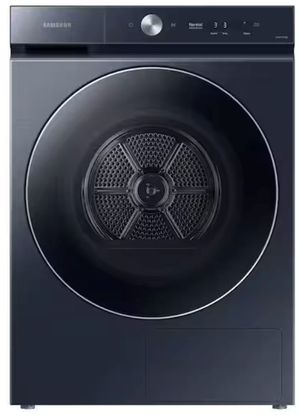
Shop this Samsung Heat Pump Dryer
This Samsung heat pump ventless clothes dryer is another ENERGY STAR certified pick with Wi-Fi connectivity. It’s the ideal dryer for the tech-savvy family. It uses AI technology for optimal drying, detecting what types of items you’re drying to choose the correct settings, and the AI Smart Dial will learn and recommend your favorite settings. It also has the capacity to handle a large families’ laundry output, and the durable stainless steel tub is built for continual use. Not only that, but it fits perfectly into a modern home design with its sleek Brushed Navy finish.
Featured Samsung #DV53BB8900HD Dryer Review:
“This dryer is one of the few ventless dryers on the market today. There are several ventless dryers with smaller sizes but there are very few ventless big dryers for reasons I do not understand. The dryer uses less than half of the energy used by my old dryer.”
Summit 4.4 Cu. Ft. White Front Load Ventless Electric Dryer
Shop this Summit Heat Pump Dryer
This Summit heat pump ventless dryer is a slim option that’s ideal for apartments, tiny homes, and other tight spaces. This ventless heat pump dryer is ENERGY STAR certified and sized just under 24 inches wide with 4.4 cubic feet of capacity. You can also pair it with the matching 115V LW2427 washer, whether you want to arrange them stacked or side by side. You can easily select the settings you want with the dial and digital controls. There are 15 dry programs to choose from, so that whatever you’re drying—delicate wool items, jeans, or wrinkle-prone clothing—will be handled properly.
Whirlpool 7.4 Cu. Ft. White Front Load Ventless Electric Dryer
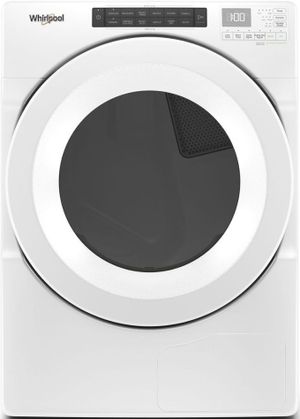
Shop this Whirlpool Heat Pump Dryer
With an energy saving dryer heat pump, this Whirlpool electric dryer is ventless and eco-friendly. It has an ample 7.4 cubic feet of capacity—perfect for large households. However, it’s still stackable and features a closet-depth fit. You don’t have to worry about overdrying, thanks to Advanced Moisture Sensing. And you can keep wrinkles at bay with the Wrinkle Shield option. Overall, if you’re looking for a dryer that simplifies your housework and saves energy, this is the one!
Featured Whirlpool #WHD560CHW Dryer Review:
“We really like this dryer. So far there have been no issues. We love being able to dry our clothes using less energy...and it is ventless!”
Breda 24” White Heat Pump Ventless Dryer
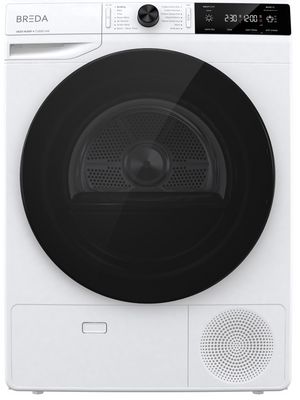
Shop this Breda Heat Pump Dryer
This clothes dryer heat pump from Breda offers 27 drying programs, making it perfect for those who want to fine-tune their laundry settings. Settings include options like Cotton Normal, Mixed Fabric, Active Wear, and Bedding. You can even opt for a Half Load setting when you want to get a small load of laundry done quickly. It can handle loads up to 19.8 pounds and features a durable stainless steel drum. If you’re looking for a user-friendly heat pump dryer with plenty of settings, this is an excellent option.
→ Learn more: The Future of Laundry: Assessing the Performance of Samsung Dryers
Whether you’ve been searching for a ventless dryer for your apartment or wanting to upgrade your old dryer to something more energy efficient, a heat pump dryer offers energy savings and flexible installation. You can opt for a high-capacity dryer or a compact option when you’re tight on space. To check out heat pump dryers in person, stop by Arnold’s Appliance!
FAQ
How does a heat pump dryer work?
A heat pump dryer operates by using a heat pump to extract air from the surrounding environment, which is then heated and passed through the drum to dry clothes. Unlike traditional dryers that expel hot, moist air, a heat pump dryer recycles this air, removing moisture and reheating the air to continue drying. This closed-loop system makes it highly energy-efficient and gentler on fabrics.
Which is better condenser or heat pump dryer?
While both options provide ventless drying, a heat pump dryer is generally better for energy efficiency and fabric care, as it uses lower temperatures and consumes less energy. However, it tends to have longer drying times and a higher upfront cost compared to a condenser dryer. A condenser dryer, on the other hand, may dry clothes faster and is less expensive initially, but it typically uses more energy, making it less economical over time.
Do heat pump dryers need venting?
No, heat pump dryers do not require external venting. They operate as a closed-loop system, meaning they condense moisture from the clothes and recycle the air within the unit. This makes them more versatile for installation in a variety of locations, including apartments or homes without an external vent.
Where to buy a heat pump dryer near me?
Washington shoppers can find energy-efficient heat pump dryers from top brands like Bosch and Samsung at Arnold's Appliance.
Why Trust Arnold’s Appliance?
Arnold's Appliance started in the summer of 1956 when it opened its doors as Lakeshore Appliance in Redmond, Washington. John Arnold and his family have since grown the store from just a few brands to the large appliance store it is today and moved to Bellevue in 1999 in search of a larger building. Arnold’s Appliance now offers high-end innovative products from over 45 manufacturers.
In addition to extensive product knowledge, Arnold’s has been providing fine appliances to Northwest builders, remodelers, designers, architects, and developers for over 47 years. Arnold's supplies products and installation to many of the finest custom and spec home builders in the Pacific Northwest. Along with single-family housing, Arnold's has also supplied products for some of the largest multi-unit projects in the area. Arnold’s, now the third generation of the Arnold Family, is dedicated to bringing the best quality products, delivery services, and installation to customers for years to come.
Shop Heat Pump Dryers at Arnold’s Appliance
Stop by Arnold’s Appliance Bellevue, WA location to see what a difference buying locally with an experienced staff can make. Or shop heat pump dryers online! Our friendly experts are always happy to help you determine whether a heat pump dryer is right for you — whether you call us at 425-454-7929, use our online chat feature, or visit us in person.
→ Learn more: How Long Do Speed Queen Dryers Last?
